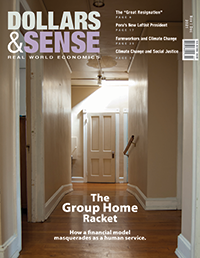This question seems to be based on the assumption that efforts to combat climate change and efforts to advance social justice are in conflict with each other. This need not be the case. In fact, social justice can advance efforts to combat climate change.

November/December 2021 issue.
The Carbon Tax Example
Consider a carbon tax, a tax that would effectively raise the price of fossil fuels, reducing the purchase of those fuels and leading to innovations that would provide other ways of producing energy. A carbon tax could be one small part of combating climate change. But one of the problems with a carbon tax is that it would fall heavily on low-income people--as, for example, low-income people tend to drive, and need gasoline, as much as the rich. So the tax, which would raise the price of gasoline, would take a higher share of the incomes of the poor than of the rich (making it a "regressive" tax).
Yet, there is another way. As in British Columbia, the revenue from the tax could be redistributed in equal shares to everyone, regardless of their income. (See Arthur MacEwan, "Reducing Green House Gases," Dollars & Sense, March/April 2016.) Thus this "rebate" would be a higher share of the incomes of the poor than of the rich (a "progressive" redistribution). Done in this way, the carbon tax could advance both social justice and the abatement of climate change.
Moreover, the imposition of a carbon tax without social justice considerations is likely to raise widespread opposition, as was the case in France. In late 2018, the French government raised the tax on fuel, which would have been a small step toward curtailing climate change. The government's action led to massive demonstrations across the country that sparked the yellow vest movement (named for the yellow vests that protesters wore). (See Aarth Saraph, "Understanding France's Gilets Jaunes," Dollars & Sense, January/February 2019.) While the fuel tax was the catalyst for the yellow vest movement, these demonstrations were also directed against the broad social injustices caused by economic inequality and instability. As a result of the protests, the government was forced to rescind the fuel tax.
Inequality, Workers, and the Green New Deal
The Green New Deal emphasizes that workers who are displaced in the effort to halt climate change should be provided with secure jobs, pay, and benefits that leave them in good conditions. For example, social justice--simply fairness--demands that workers in the fossil fuel industry not be forced to bear the burden of those efforts from which we all benefit. There is no need for these provisions of the Green New Deal to place social justice in conflict with environmental protection. Quite the opposite.
As the experience with the Keystone XL pipeline demonstrated, workers and their unions will often oppose initiatives to halt climate change when their jobs are at risk. The pipeline into the United States would have facilitated the development of the Canadian tar sands oil deposits, the burning of which emits high levels of carbon dioxide. After years of struggles by groups opposed to the pipeline, the Biden administration finally stopped the construction of the pipeline earlier this year. The struggles to halt the pipeline took longer and might have been lost because the unions of the workers who would have been employed to build the pipeline, along with some allies in the labor movement, supported its construction. In an economy with a high degree of economic inequality, job insecurity, and weakened labor unions, some workers will oppose programs that would curtail climate change but threaten their jobs. Efforts to reduce inequality, create job security, and strengthen unions--all social justice efforts included in the Green New Deal--are, then, good foundations for combating climate change.
The Ethical Issue
It is easy to see the concern for social justice expressed in the Green New Deal as solely an ethical issue. It is an ethical issue: as with all economic programs, efforts to halt climate change should take into account the way they have different impacts on different social groups. Workers, the poor, and people of color have suffered disproportionately from air and water pollution and from the initial impacts of climate change; every effort should be made to prevent them from bearing new burdens from actions to halt climate change. This seems only fair.
The social justice provisions called for in the Green New Deal, however, are not solely an ethical issue. Advancing social justice can be an important foundation for the fight against climate change.
